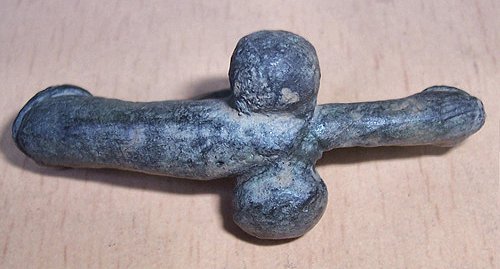from LOVE, SEX AND TRAGEDY: how the Ancient World shapes our lives
by Simon Goldhill
(John Murray, London 2004)
"For a thousand years or more, a Christian couldn't, shouldn't be fat. Fat might be a political issue for the classical Athenian: for the Christian it was a religious issue that imperilled your mortal soul. Today if you give up chocolate for Lent or eat fish on Fridays, or even if you just get the joke of Robin Hood's Friar Tuck with his big belly and his love of food, you are imitating these distant but foundational models of sainthood, however feebly. Here's how wone fourth-century theologian summed up the good of fasting - rather like a salesman extolling the powers of a wonder-drug: 'fasting...cures diseases, dries up bodily humours, puts demons to flight, gets rid of impure thoughts, makes the mind clearer and the heart purer, the body sanctified and raises man to the throne of God.' With such amazing benefits from fasting, it is perhaps not so surprising that Gregory of Nyssa declared that the sense of taste is 'the mother of all sins'. The difference from the classical world couldn't be more vividly marked. Greeks and Romans loved their fish, their pickles, their cheese, an eel, some oil, well-kept wine.
Terence, the Roman comic playwright wrote 'sine Cerere et Libvero friget Venus' - without Food and Wine sex goes cold. He was recommending a nice dinner and a few drinks to help seduction and sexy pleasure. The same words are quoted with humourless approval by the Christian St Jerome - but to show why fasting helps damp down sexual urges.
Sexuality was the other key battleground where the ascetic's deprivation aimed to bind his fleshly desires. The struggle for Purity of Heart in the desert produces extraordinary stories of temptation and willpower. Greek philosophers had praised self-control (Alcibiades could rise untouchged from the bed of Socrates), but abstinence, the total denial of pleasure, was a dangerous and unpleasant extreme in their eyes. As the goddess Thetis says to her son Achilles in the Iliad: 'it's good to sleep with a woman'. But for the Christian ascetics, total repression of sexual urges was the aim.
The difficulty was the inevitable inability of men to control fantasy, dreams, or even the responses of the body. The erection, the wet dream, the unbidden memory, humiliated the godly. That difficulty proved the need for increased vigilance and effort. And still the godly were humiliated. Those dreams, those tempting fantasies, showed up each man's innermost state of purity. However much a thin body and a holy look could signal purity, sexuality was a barometer of the most intimate, secret and telling fight with sin and impurity. Even if sexual behaviour could be curbed and sexual longings dulled, what rose up in the nightr was a constant reminder of a battle not yet won.
'I pity you if you are not thinking about sex,' writes one ascetic, 'because [if not] you must be doing it'.
Stories of the failure of sexual control abound, from nocturnal emissions and lingering dreams to the more consequential slips of siring children or sexually harassing the novices. 'Purity of heart' moves easily into fear of temptation, and from there to misogyny. This can be expressed in brutally physical form. One monk is described as dipping his roves into the putrefying body of a dead woman, so that her smell would prevent any thoughts of women that did not reek of flesh and death. The chastity of a monk was a fragile possession, threatened on all sides, and most of all from within. Conquering Satan is a full-time job.
... The Christian glorified the martyr's torture; and he so revelled in the body's violation that one martyr, as he is repeatedly stabbed, thanks his torturers, since now he has 'so many more orifices through which to praise God'.
... The culture heroes who became the saints of Christianity took the image of the classical body and redrafted it in the most shocking way. The biblical idea of the 'service of God' was crystallised into a notion of human slavery that brought with it the slave's abasement, suffering, humiliation and torture - but cast as positive qualities. Christianity does not simply spring up from Jesus or from Paul. Its radical newness stems from a precise overturning of traditional classical values. This is the beginning of Christianity's long and turbulent engagement with Greece and Rome. During its foundational centuries, Christianity meant living our an anti-classical logic of separation, deprivation and pain to prove a love of God to a wondering world."

The Classical (especially Roman and Romano-Celtic) love-affair
with the phallus is still shocking to most of the world today. Two thousand
years ago it was carried in processions, used to make public memorials,
put up in doorways and at crossroads, used for bell-pulls and lamps,
painted, sculpted, handled in religious, political and theatrical contexts
as much as in private, relaxed, informal ones. What the modern West
(let alone Islam) stigmatises as the essence of obscenity and bars everyone
from viewing because it will 'corrupt and deprave', was displayed all
around the Classical world, just as images of scantily-clad women are
unavoidably to be seen today everywhere in the non-Muslim world. (Islam
adopted all the Christian hatred and fear of the body - and then some.)

The difference between modern and ancient attitudes is not just a matter
of taste or custom. How the phallus is displayed reveals fundamental
aspects about a culture's sense of the body and sexuality - and sensuality.
About that it means to be a person, male or female. The Romans, Greeks
and Celts had frankly joyous relationships with sexual organs and acts.
Wonderfully 'obscene' carvings adorned even sarcophagi. The afterlife
might include sex - not be the punishment for it.
Homosexuality is another area of huge difference. Greek culture celebrated the love of the bearded male for the beardless youth - what is regarded with horror today as Pædophilia. "Well-born" Greeks would have regarded with horror the love of the bearded male for another bearded male, let alone the idea of 'homosexual marriage'. They would have been appalled likewise by the idea of sodomic penetration, since their activity involved mutual masturbation, fellatio and frottage inter-femoral or inter-crural. In their culture sodomy was largely a heterosexual practice, performed by lustful men disgusted by menstruation, or for the purposes of contraception.
Indeed it is likely that most anal-penetrative acts were, until the invention of contraceptive gadgets and pills, heterosexual.
Unlike the Early Christians, the Greeks were staunch believers in family. Extra-marital homosexual relationships tended to prevent extra-marital heterosexual ones, and reinforced the stability of the nuclear family. But pre-Constantinian Christianity's contempt for family and 'Family Values' was considered dangerously anti-social, and, together with Christians' refusal to acknowledge any Roman Emperor as a god, led to their persecution - though a persecution much less than Christian propaganda would lead us to believe. Indeed the persecution of 'pagans' and the destruction of 'idols' and 'obscene' statues was a continuing pogrom, a holocaust far more destructive than the later depredations of the Goths and Huns and Vandals.
Early Christians abhorred the family - recognising like Diogenes that it was an excluding, patriarchal cell. Thus they abhorred marriage, and it was not until the 13th century that it became a Catholic sacrament. Early Christians abhorred property, abhorred the body, food and wine for pleasure, and all things "of this world" - especially sex and money, the terrible Twin Towers of our culture.

